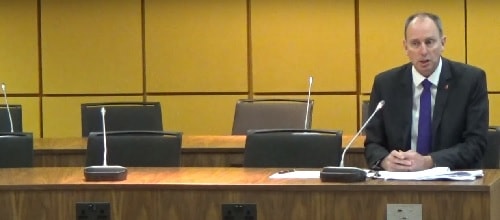Is the public receiving value for money for the £2.5 million spent on the Mayoral election?
This tale is a rather tangled web involving Liverpool City Council’s involvement in the Liverpool City Region Combined Authority Mayoral election, the Electoral Commission and the Cabinet Office. It’s an update to Why has Liverpool City Council blocked my request to view the nomination papers of the 8 candidates wanting to be Liverpool City Region Combined Authority Mayor?

You would think that asking the Liverpool City Region Combined Authority Returning Officer Ged Fitzgerald (pictured above) for a copy of the candidates’ nomination papers would be a simple matter.
After all shouldn’t it be I ask, they are sent? It ran smooth enough with the nomination papers for candidates in the Claughton byelection and we can then publish them.
Instead this ends up being a tangled web of corporate governance involving Liverpool City Council, the Electoral Commission, the Cabinet Office and the Department for Communities and Local Government.
Considering there is a general election on the way might it be an idea to have some clarity on these issues?
Liverpool City Council’s response is that I am not allowed to inspect based on Electoral Commission guidance which refers to a candidate’s right to inspect and object.
The Electoral Commission agrees with me that the Electoral Administration Act 2006 applies (but only if there is other secondary legislation that applies), specifically s.42, s.43 and s.44 but state that the legislation I am requesting a copy of the nomination papers under Sch.3, Pt 2, para 11 of the Local Elections (Principal Areas) (England and Wales) Rules 2006 doesn’t apply to elections of combined authority mayors because rule 2 in their view doesn’t cover combined authority mayoral elections.
I am then referred back to the Combined Authorities (Mayoral Elections) Order 2017.
The problem is the guidance that the Electoral Commission issued and their current guidance relies on the original version of the Elections (Principal Areas) (England and Wales) Rules 2006 from 2006.
Combined Authorities (Mayoral Elections) Order 2017, Schedule 4, paragraph 3 amended Rule 2 of the Local Elections (Principal Areas) (England and Wales) Rules 2006.
The Cabinet Office was approached for their response. The Cabinet Office Press Office emailed us and stated that the Cabinet Office cannot comment on the Liverpool City Region Combined Authority Mayoral Election because Parliament has been dissolved and we are in the pre-election period before a general election. I thank the Cabinet Office for taking the time to reply.
So of course when I wrote about this, (published at 9:52 on the 3rd May 2017) within 37 minutes of publishing Wirral Council contact me and refuse my press accreditation for the Claughton byelection, general election and Liverpool City Region Combined Authority Mayoral election.
Then shortly after the Liverpool City Region Combined Authority Returning Officer refused a similar request to attend the count too.
Local government officials are paid large amounts extra on their salary be paid to do a job. The overall amount paid for by the taxpayer for running this election (which is paid for by the Liverpool City Region Combined Authority) is from memory £2.5 million (although this report agreed by the Liverpool City Region Combined Authority states that’s £2 million for staff and £0.5 million on the candidates booklet sent to each household (although the candidates in it had to pay towards its costs too).
I admit the above is a minor point but if it symptomatic of what is going on then shouldn’t some of these fees either be claimed back or not paid at all?
At the Employment Tribunal of Alison Mountney we heard that Surjit Tour and Kate Robinson provided assurance (and were both paid extra) that the election was being run as it should. For this they were paid extra money (a four-figure sum extra each).
I’ve no idea who provides the assurance in a Combined Authority Mayoral election to the Combined Authority Returning Officer Ged Fitzgerald or the Local Returning Officer Eric Robinson.
All I will say is that pieces like this wouldn’t be possible to write if you’d approved our attendance at the count as we wouldn’t have the time to write them! So thank you!
If you click on any of the buttons below, you’ll be doing me a favour by sharing this article with other people.

